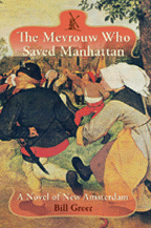Bill's Brownstone
Wander through New York's Past and Present with
the author of The Mevrouw Who Saved Manhattan
Dutch Days
"The Company's beer was so bad the profits couldn't service the mortgage on the City Tavern even in a hard-drinking town like ours."-- Mevrouw Jackie Lambert in
The Mevrouw Who Saved Manhattan.
In 1642, the West India Company built the Stadts Herbergh, the City Tavern, at the corner of Coenties Alley and Pearl Street. While the stone building was intended to be a respectable inn for travelers visiting the growing colony, its patrons were more frequently brawling drunks, refugees fleeing wars with the Indians or men jailed for running afoul of the authorities.
In one infamous incident, several Dutchmen and their wives were enjoying a private dinner when John Underhill burst into the room. The Englishman Underhill was none too popular, having brought fifty soldiers to fight Indians in what the townspeople considered a war started when Director Kieft brutally massacred a local tribe.
When the dinner's host refused to drink with him, Underhill and his companions drew swords and began smashing up the tavern. "Clear out," Underhill thundered, "for I shall strike at random." When the soldiers summoned could not quell the Englishman's fury, the guests decided discretion was the better part of valor. "To prevent more serious mischief, yea, even bloodshed," one testified, "we broke up our pleasant party."
In subsequent years, Englishmen more likely occupied the tavern as prisoners. A Scotsman claiming all of Long Island for an English Earl involuntarily made his home there, as did George Baxter, a member of Stuyvesant's Council until he raised the Britannia Cross on Long Island during one of the wars with England.
When Holland forced the West India Company to let New Amsterdam form a municipal government, the Company decided the tavern's profits didn't justify the mortgage payments. In return for assuming the debt, it turned the building over to the town for the Stadt Huys, or City Hall.
Even before, the tavern was used for judicial proceedings such as The Great Shirt Case of 1646. A sailor Claes Pietersen accused Jan Jansen of stealing two shirts. No, Jansen said, the shirts in his possession resembled those he had bought in Amsterdam. Finding no fault with Pietersen, the court awarded him the shirts on condition that when he next returned to Holland, he point out the Amsterdam shop where he bought them.
On a more convivial note, the town fathers feted Director Stuyvesant. "As the Right Honorable intends to depart," the burgomasters noted before Stuyvesant sailed for the Caribbean, we "shall complent him before he take his gallant voyage ... and provide a gay repast ... in the Council Chamber." This was a quite unusual affair as Stuyvesant and the town fathers typically fought each other tooth and nail.
Bill's Book
The Mevrouw Who
Saved Manhattan
A Novel of New Amsterdam
like etchings by
Van Ostade and Steen."
-- Charles Wendell, Ph.D.,
President of the
New Netherland Institute

on a madcap ride through
New York history.
More about the book.
Amazon
for the Kindle
and the Nook
and see what you think
laughing out loud."
right on the money."
better ... toward a
highly satisfying resolution."